I had a realization the other day. Quite often, I express my disdain for volunteers who want to come and "serve" our community. However, after thinking more about that, it dawned on me that I actually really like volunteers. We have some absolutely wonderful volunteers.
What I realized was that the expression of my disdain stems from two things:
1) The majority of volunteers want to "serve" on their terms. They will offer their time after 7:00 p.m. during the weekdays or on Saturdays or Sundays. Some even seem to get upset as if we should be appreciative of the time they offer and change our schedule so that we *can* have their volunteer services. Many volunteers explain exactly what they can and will offer, yet when we tell them what we need (i.e. homework help) they decline because it is not what they wanted to offer us. They come with their own solutions in mind without even asking what the problem is and without assuming that we might already have come up with a solution that we need help implementing.
It's almost like offering to volunteer is a way out. When we refuse what they have to offer, they are off the hook. They can then say they have offered and we won't accept it. It makes them look like the good guys. Volunteers and groups have offered Christmas gifts, winter coats, loads of bicycles, snacks for children, programs, etc.
I have said no to a number of these offers. I have had people leave very upset because we would not accept their "generosity." Our kids and families have too much to offer for them to be someone's "service project." If they were to get to know the people I know, they would realize how much someone has to offer. They would look longer term than a one-time Christmas gift that makes the giver feel more special than the receiver. If they got to know the people I know they would realize they have dreams, goals, and ambitions they are hoping to fulfill. One time neighborhood clean ups don't offer that. Offering one-time parties doesn't create partnerships that help them reach those goals.
One-time events offer off-brand bandaids (the ones that don't stick) to the pain and frustration. It doesn't help a teenager fill out a college application and then walk with them through the process year after year getting paperwork, financial aid, college loans, tutors, etc. It doesn't help a parent get the education needed to obtain a job that is meaningful to them. It doesn't help a child learn basic (and advanced) skills so that when he/she becomes an adult, he/she is academically prepared to enter into any field he/she chooses.
2) When people talk about wanting to get volunteers to help, 99% of the time they are talking about getting people from outside of the community where they serve. They don't even think about the capacity that already exists right inside the community.
Though many of the parents of the kids in our After-School Academy (ASA) are not formally educated, they are willing to learn. Through our staff development meetings, we bring in the highest quality college professors, school principals, etc. in order to help us understand best practices in education.
But even without the educational training the ASA offers, the parents are an invaluable resource. The parents who run our ASA have recruited a full roster of kids #1 because they believe in it and #2 because they are running it. The parents and others in the community bond together in a way that people outside of the community would not be aware of because it happens before or after hours--when outsiders to the community are usually in the comfort of their own homes.
(For a few examples: I learned the other day that Sylvia has started a "walking club" with a few of the parents. I hear her warning them that she is going to call them the next morning to get them up so they can walk. She said they have also attempted a pilates class. Wyshina has two kids of her own and knows her neighbor isn't really motivated to read to her own kids so Wyshina invites the kids to her house and they all get together and read books to each other. Keisha and Wyshina dispelled some community rumors and frustrations of parents who thought it was it was unfair to have to pay for an after-school program. When they explained the many opportunities we offer--like chess, golf, ballet, and other great opportunities--the parents became interested in enrolling their own kids. Chanel invited another parent's child over to play because the parent had expressed frustration with the unsupervised children her son was around. 6th graders who were formerly in the ASA are now classroom assistants and some are even helping teach classes.)
We have a lot of volunteers and partnerships in our ASA. Only a few are from outside of the community. We are selective. We believe our community deserves to have people who are committed, passionate, and willing to get to know us, our needs, and our capacities. We do not need to be someone's one-time service project.
If you are interested in volunteering, we welcome you. But, if you are coming in from outside of the community, please think about what it would feel like if someone you didn't know knocked on your door then, when you answered, proceeded to tell you about some program you needed, without ever attempting to get to know you, your family, your needs, your wants, or your abilities.
If you are willing to get to know us, give me a call.
Saturday, September 30, 2006
Friday, September 29, 2006
A future teacher making a difference now
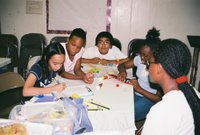 Jessica Orogbu is one amazing person. She is currently a sophomore education major at Texas A & M-Commerce. Jessica began attending our University of Values (UV) summer program several years ago. After "aging out" of that program, she came back to volunteer. Her committed volunteering efforts eventually earned her a teacher position at UV. She enjoyed teaching so much that during her senior year she found a job working for a daycare. Though she was making much more money at the daycare, she loved the kids at UV. She took a pay cut during the summer to come back and work with us. She worked with us every summer until going off to college last year.
Jessica Orogbu is one amazing person. She is currently a sophomore education major at Texas A & M-Commerce. Jessica began attending our University of Values (UV) summer program several years ago. After "aging out" of that program, she came back to volunteer. Her committed volunteering efforts eventually earned her a teacher position at UV. She enjoyed teaching so much that during her senior year she found a job working for a daycare. Though she was making much more money at the daycare, she loved the kids at UV. She took a pay cut during the summer to come back and work with us. She worked with us every summer until going off to college last year.I tell Jessica all the time that she is my mentor. Jessica did all of her college entrance paperwork completely on her own. She would periodically call me to ask for advice on what to do next, but beyond that, she did all of the footwork. I am amazed by her willingness, her determination, and her leadership toward others. (She also made sure all of her friends got their college paperwork in on time).
Jessica is majoring in Education and is so excited to become a teacher. I am so excited to know that in about 3 more years some lucky kids will have an outstanding teacher leading them! Today I received this email from her that I had to share:
Hello Ms. Janet,
Hey I learned a new thing in Psych 300 that I think could be implemented into summer camp if it gets up and running again. As an afternoon class I was thinking a social skills class. Studies show that one hour of social skills training a week, dramatically improves the behavior of a child.(Psych 300....I love it) But it could go over things as simple as what to do if you see someone drop a $20 bill. Even more helpful teaching children to ask questions. As weird as it seems, She said a lot of children feel that asking questions are wrong. It has to do with as a child when they ask the "why" questions to their parent, the parent response which is usually, "Stop asking questions" or something to that nature, traumatises a child. The child then starts to think that asking questions is wrong. So when they are in school and don't ask questions they fall behind. Which again studies show that if a child falls behind for about one month, their TAKS score is found to be three times lower. I think this class could be good for camp as an afternoon class and it doesn't have to be boring. They can role play situations, watch films, and other exciting things. I guess it shows that the entire time she was talking about this, I was thinking about kids camp. lol. Well just wanted to tell you what was on my mind. I hope you have a great day. I will see you tomorrow and I will not be attending the TREK run but I will come to the banquet. I will call you probaly tonight or tomorrow.
Jessica
People like Jessica make me excited about the future and the possibilities our children possess. Keep her (and all of the other budding children) in your prayers.
Wednesday, September 27, 2006
Life's challenges
A couple of years ago I was getting new tires at Discount Tire. The guy changing my tires recognized me. Though his face looked familiar, I wasn't sure where I knew him from. As we talked, I realized the last time I had seen him was at Central Dallas Church when he was probably 12 years old. (Kids change a LOT as they grow into young men and women!). We chatted for a little while and I encouraged him to come back and visit Central Dallas Church. I may have given him my card. I don't remember. I remember when his family was there before--mom, dad, brother, and two sisters--they were all wonderful people who were very involved. I didn't ever know what happened or why they left.
Monday, I had a message on my desk saying Rodrigo Sanchez (not his real name) called. The name didn't sound familiar, but when I called back Rodrigo reminded me who he was. Rodrigo is 22 years old now. He explained that he is really struggling. He said he tried to find our church, but since it had moved to the Washington Street location, he couldn't find it. He wants to "do something with his life." He wants to "get back on track." He thought Central Dallas Church would be a way to start.
Rodrigo began telling me what he's going through right now. He said he's been in "some trouble" but wants to get out of that. When I asked him what kind of trouble, he said he has a problem with drinking. He's ended up with a few assault charges--one was a felony, the other two got dropped to misdemeanors. He talked to me for about 30-45 minutes talking to me about what has happened to him over the years.
He explained that after the first or second assault charge, his probation prohibited him from using drugs. He gave up cocaine and some of the other hard drugs he had been using. When he tried to go back to them, he didn't feel the same so he decided to quit. He has been free from them for about 2 years. However, alcohol continues to be his vice. After the last assault charge, he woke up his sister the next day and asked her to go with him to AA (Alcoholics Anonymous).
Of course, with the felony, he has a hard time finding a job. His mom keeps telling him everything will be ok, but he realizes that unless he does something to change, it won't be. He doesn't want to be like he is. He expressed that over and over again. He's not sure how to get out of doing what he's doing, but he's trying. When he couldn't find the church, he called. He's meeting me this Thursday to go with me to the Bible study I go to on Thursdays, which is primarily geared toward ex-offenders.
He has two kids he wants to change for. I pray that his desire to do things different will continue. I pray that some of the resources I hope to hook him up with will be some that he can fit into and feel connected to. He's young. I know it's hard to try to make such a change when so many around him are continuing down a destructive path.
He's taking the initiative. He's already stopped using drugs. I know he has it in him to change the rest as well. Please pray for him.
Monday, I had a message on my desk saying Rodrigo Sanchez (not his real name) called. The name didn't sound familiar, but when I called back Rodrigo reminded me who he was. Rodrigo is 22 years old now. He explained that he is really struggling. He said he tried to find our church, but since it had moved to the Washington Street location, he couldn't find it. He wants to "do something with his life." He wants to "get back on track." He thought Central Dallas Church would be a way to start.
Rodrigo began telling me what he's going through right now. He said he's been in "some trouble" but wants to get out of that. When I asked him what kind of trouble, he said he has a problem with drinking. He's ended up with a few assault charges--one was a felony, the other two got dropped to misdemeanors. He talked to me for about 30-45 minutes talking to me about what has happened to him over the years.
He explained that after the first or second assault charge, his probation prohibited him from using drugs. He gave up cocaine and some of the other hard drugs he had been using. When he tried to go back to them, he didn't feel the same so he decided to quit. He has been free from them for about 2 years. However, alcohol continues to be his vice. After the last assault charge, he woke up his sister the next day and asked her to go with him to AA (Alcoholics Anonymous).
Of course, with the felony, he has a hard time finding a job. His mom keeps telling him everything will be ok, but he realizes that unless he does something to change, it won't be. He doesn't want to be like he is. He expressed that over and over again. He's not sure how to get out of doing what he's doing, but he's trying. When he couldn't find the church, he called. He's meeting me this Thursday to go with me to the Bible study I go to on Thursdays, which is primarily geared toward ex-offenders.
He has two kids he wants to change for. I pray that his desire to do things different will continue. I pray that some of the resources I hope to hook him up with will be some that he can fit into and feel connected to. He's young. I know it's hard to try to make such a change when so many around him are continuing down a destructive path.
He's taking the initiative. He's already stopped using drugs. I know he has it in him to change the rest as well. Please pray for him.
Labels:
Central Dallas Church,
change,
children,
crime,
young adults
Sunday, September 24, 2006
Wasteful spending??
Today's headline in the Dallas Morning News: DISD Misused Federal Grants.
My first reaction to this article was irritation.
No wonder our kids in DISD aren't doing well when the principals and teachers are spending money on flowers for their secretaries, playstations for the kids, and cute throws for the teachers...all in the name of "encouragement!"
I do not agree with incentives in the first place. I believe that too many people work too hard trying to buy a child's (and parent's) interest in education rather than making the education process interesting and meaningful enough so that kids (and parents) have internal motivation and incentives to participate.
I think this is especially bad in the inner city. I hear people say all of the time, "That's the only way 'these' kids will want to learn." or, "That's the only way 'these' parents will participate is if we feed them or pay them." I don't buy it. I have a full staff of parents in our After-School Academy. I truly believe they work so hard because the After-School Academy is a meaningful way for them to participate in their child's education. I'm sure it's not for money because they could go other places and get more hours and probably make more per hour.
I wish people would work hard to figure out how to spend that extra grant money on cool, educational things that could pique a child's interest instead of trying to bribe them into attending school by offering them a playstation.
My second thought was indignation.
How could they possibly take grant money allocated for the kids and spend it on employees and themselves??
Yet, I quickly thought of the times that I, too, have wanted to let the employees of our After-School Academy (ASA) know that they are appreciated. Though there are times I purchase things out of pocket, there are times where I take liberties to purchase things using our ASA budget as well. Maybe I, too, should be more careful.
My final thought was about inequity.
I have friends who work for corporations and companies that use incentives and give their employees business credit cards. My friends have been given jump drives (that cost about $60+ in the store) and backpacks designed for laptops. They have been given Treos and Blackberries complete with unlimited text messaging, email, and whatever other amenities are possible. Not too long ago a friend came through Dallas on business and took me to eat. He assured me his company would pay for it and wouldn't mind a bit. We even went up the street after dinner to enjoy ice cream on the company. Several years ago, a friend of mine worked for a large accounting firm in Chicago. He and a couple of his co-workers purchased Bulls tickets on the company's credit card.
Why is it that when a public company provides these "extras" no one says a word? For companies and corporations, these "extras" are so common that I think the employees would probably be offended if they weren't included.
Yet, when someone works with children or in the social service sector, perks are seen as frivilous and mis-spent money. I suppose "civil servants" are supposed to be sacrificial in every aspect of their job and life. A pat on the back should be sufficient.
It is somewhat humorous to me that it is our money being "wasted" in private companies just the same as it is our money being "wasted" in publicly funded companies. We are willing to look the other way in a private company, yet we want to stand up, bang our fist on the table, and demand that they re-think giving our money away to "wasteful" venues when we talk about our tax dollars (especially when what those tax dollars are being spent for doesn't directly benefit us!).
I'm actually not defending DISD. I would like to see DISD's money used appropriately--and I don't think it always has been. DISD has a lot of work to do, in my opinion. But before I jump on the bandwagon of condemning DISD, I have to think through the accusations and realize that theirs may be no different than any company. They're just an easier target.
My first reaction to this article was irritation.
No wonder our kids in DISD aren't doing well when the principals and teachers are spending money on flowers for their secretaries, playstations for the kids, and cute throws for the teachers...all in the name of "encouragement!"
I do not agree with incentives in the first place. I believe that too many people work too hard trying to buy a child's (and parent's) interest in education rather than making the education process interesting and meaningful enough so that kids (and parents) have internal motivation and incentives to participate.
I think this is especially bad in the inner city. I hear people say all of the time, "That's the only way 'these' kids will want to learn." or, "That's the only way 'these' parents will participate is if we feed them or pay them." I don't buy it. I have a full staff of parents in our After-School Academy. I truly believe they work so hard because the After-School Academy is a meaningful way for them to participate in their child's education. I'm sure it's not for money because they could go other places and get more hours and probably make more per hour.
I wish people would work hard to figure out how to spend that extra grant money on cool, educational things that could pique a child's interest instead of trying to bribe them into attending school by offering them a playstation.
My second thought was indignation.
How could they possibly take grant money allocated for the kids and spend it on employees and themselves??
Yet, I quickly thought of the times that I, too, have wanted to let the employees of our After-School Academy (ASA) know that they are appreciated. Though there are times I purchase things out of pocket, there are times where I take liberties to purchase things using our ASA budget as well. Maybe I, too, should be more careful.
My final thought was about inequity.
I have friends who work for corporations and companies that use incentives and give their employees business credit cards. My friends have been given jump drives (that cost about $60+ in the store) and backpacks designed for laptops. They have been given Treos and Blackberries complete with unlimited text messaging, email, and whatever other amenities are possible. Not too long ago a friend came through Dallas on business and took me to eat. He assured me his company would pay for it and wouldn't mind a bit. We even went up the street after dinner to enjoy ice cream on the company. Several years ago, a friend of mine worked for a large accounting firm in Chicago. He and a couple of his co-workers purchased Bulls tickets on the company's credit card.
Why is it that when a public company provides these "extras" no one says a word? For companies and corporations, these "extras" are so common that I think the employees would probably be offended if they weren't included.
Yet, when someone works with children or in the social service sector, perks are seen as frivilous and mis-spent money. I suppose "civil servants" are supposed to be sacrificial in every aspect of their job and life. A pat on the back should be sufficient.
It is somewhat humorous to me that it is our money being "wasted" in private companies just the same as it is our money being "wasted" in publicly funded companies. We are willing to look the other way in a private company, yet we want to stand up, bang our fist on the table, and demand that they re-think giving our money away to "wasteful" venues when we talk about our tax dollars (especially when what those tax dollars are being spent for doesn't directly benefit us!).
I'm actually not defending DISD. I would like to see DISD's money used appropriately--and I don't think it always has been. DISD has a lot of work to do, in my opinion. But before I jump on the bandwagon of condemning DISD, I have to think through the accusations and realize that theirs may be no different than any company. They're just an easier target.
Wednesday, September 20, 2006
Each one, reach one
Greeting.
Helping.
Teaching.
Hugging.
Learning.
Laughing.
Experiencing.
Interacting.
This is what I saw when I walked into the After-School Academy this week.
Jasmine McMillon, an 8-year old who has traditionally been one of our "handfuls" at times, leaned over, wrapping her arms around a 6-year old to help him write his letters.
Kids greeted visitors with a smile, a firm handshake, and a pleasant greeting.
Parents sat with children and helped them with their homework.
Sixth graders, in their new volunteer role, cleaned, taught, assisted, guided, and facilitated.
---------------------------------------------------------------------------------------
---------------------------------------------------------------------------------------
Tuesday we found out we didn't have as many teachers as we thought we had. We needed a teacher for the 5th grade Book Club group.
You would think that I would have learned by now that the answers are right under our nose.
The solutions are simply in focusing on the capacity of the community.
After stressing over the lack of available adults for about 10 minutes, it dawned that we had what we needed at our fingertips! The sixth graders we had in the volunteer training on Saturday were doing an amazing job in assisting. Now all we had to do was to bump up their leadership role. With the right training, they can be our facilitators!
Jhor-Dai, a sixth grader who has been in the ASA for several years now, agreed to be the facilitator. She is reading the book in her 6th grade reading class. So, not only do we get a teacher, but I know from experience that teaching helps you learn. I'm convinced her preparation for this class through our weekly meetings and her own research can only deepen her knowledge and enhance what she's doing in school.
Clarence, a new volunteer...also in sixth grade, also was a key helper in the class. Jeremy* (not his real name) is in the fifth grade book club but struggles to read even the easiest books. In an attempt to be discreet, I asked Clarence to pair up with Jeremy since we were short on books. The next time I checked on them Clarence was doing most of the reading and they were both discussing. Clarence informed me that he was helping Jeremy with his reading. Without me saying a word, Clarence had recognized Jeremy's struggle without judgment and both were ok with the nature of the relationship.
The capacity is in the community.
Helping.
Teaching.
Hugging.
Learning.
Laughing.
Experiencing.
Interacting.
This is what I saw when I walked into the After-School Academy this week.
Jasmine McMillon, an 8-year old who has traditionally been one of our "handfuls" at times, leaned over, wrapping her arms around a 6-year old to help him write his letters.
Kids greeted visitors with a smile, a firm handshake, and a pleasant greeting.
Parents sat with children and helped them with their homework.
Sixth graders, in their new volunteer role, cleaned, taught, assisted, guided, and facilitated.
---------------------------------------------------------------------------------------
---------------------------------------------------------------------------------------
Tuesday we found out we didn't have as many teachers as we thought we had. We needed a teacher for the 5th grade Book Club group.
You would think that I would have learned by now that the answers are right under our nose.
The solutions are simply in focusing on the capacity of the community.
After stressing over the lack of available adults for about 10 minutes, it dawned that we had what we needed at our fingertips! The sixth graders we had in the volunteer training on Saturday were doing an amazing job in assisting. Now all we had to do was to bump up their leadership role. With the right training, they can be our facilitators!
Jhor-Dai, a sixth grader who has been in the ASA for several years now, agreed to be the facilitator. She is reading the book in her 6th grade reading class. So, not only do we get a teacher, but I know from experience that teaching helps you learn. I'm convinced her preparation for this class through our weekly meetings and her own research can only deepen her knowledge and enhance what she's doing in school.
Clarence, a new volunteer...also in sixth grade, also was a key helper in the class. Jeremy* (not his real name) is in the fifth grade book club but struggles to read even the easiest books. In an attempt to be discreet, I asked Clarence to pair up with Jeremy since we were short on books. The next time I checked on them Clarence was doing most of the reading and they were both discussing. Clarence informed me that he was helping Jeremy with his reading. Without me saying a word, Clarence had recognized Jeremy's struggle without judgment and both were ok with the nature of the relationship.
The capacity is in the community.
Labels:
After-School Academy,
capacity,
children,
community,
Turner Courts
Tuesday, September 19, 2006
Acceptance
Children are who they are.
They know what they know.
They bring what they bring.
Our job is not to wish that students knew more or knew differently. Our job is to turn each student’s knowledge and diversity of knowledge we encounter into a curricular strength rather than an instructional inconvenience.
We can do that only if we hold high expectations for all students, convey great respect for the knowledge and culture they bring to the classroom, and offer lots of support in helping them achieve those expectations.
~P. David Pearson, “Reclaiming the Center”
They know what they know.
They bring what they bring.
Our job is not to wish that students knew more or knew differently. Our job is to turn each student’s knowledge and diversity of knowledge we encounter into a curricular strength rather than an instructional inconvenience.
We can do that only if we hold high expectations for all students, convey great respect for the knowledge and culture they bring to the classroom, and offer lots of support in helping them achieve those expectations.
~P. David Pearson, “Reclaiming the Center”
Parents don't send us their worst or least educated children and keep the others at home. They send us the best they've got. My experience is that parents send us (the educators) their children hoping and trusting that we will provide them with skills that will help them be "successful" in life. I don't hear of a lot of parents who intentionally try to sabotage their child's education. Everyone I know wants their child to be bright, smart, and successful. They expect the educators to do what they oftentimes can't. Sometimes they can't because they work too much. Sometimes they can't because they're addicted to drugs. Sometimes they can't because they don't have the education. It doesn't matter what the reason is. We owe the children (and the parents) the best we have to offer.
Tuesday, September 12, 2006
Excitement creates energy!
Monday we started our first day of training for the After-School Academy. I am so excited about this year! The possibilities in the room were energizing!
I must admit, after losing Rachel Embry, our Children's Education Coordinator of two years, I was sad and frustrated. I knew we couldn't find another person with her level of skills for the amount of money we were willing to pay. Not only had she taken a pay cut to work at Central Dallas, she had gone above and beyond to build relationships with families in the community. She spent more than her 40 hours/week doing things with and for the After-School Academy. I wasn't sure how we were going to find someone else of her calibur.
After thinking about it for a while, I had an a-ha moment. In the past, I've utilized the teenagers from the community to run the programs. Despite what some people said, I believed they could do it. I trained them in educational strategies and held them to a high standard. I expected more of them than many people expect of adults on the job, but the teenagers rose to the expectations and they did an amazing job.
Because the older kids get out of school later than the elementary kids, we cannot hire teenagers to run the After-School Academy. However, we do have parents...many who aren't working at this moment...many who are not formally educated (yet)...many who are struggling to find ways to make ends meet while also making sure they are there for their kids. I had held high expectations for the teenagers and they achieved. I could do the same with the adults!
 Wyshina Harris, our new Children's Education Coordinator, was promoted from the Assistant to the Coordinator a couple of months ago. She has done an amazing job! While she was still in the Assistant position, Wyshina began to realize that working with kids and Education was her calling. She has now decided to go back to school to pursue a degree in Education.
Wyshina Harris, our new Children's Education Coordinator, was promoted from the Assistant to the Coordinator a couple of months ago. She has done an amazing job! While she was still in the Assistant position, Wyshina began to realize that working with kids and Education was her calling. She has now decided to go back to school to pursue a degree in Education.
Sylvia Harris is new to our staff and new to the program. She has only been in Turner Courts a few months. She came to the office to enroll her kids in the After-School Academy a few weeks ago. I suggested she apply for the Assistant position. After going through the interview process and deciding that she was the right fit for the job, Debbie Moss, our Human Resources Manager, called to extend her an offer. Debbie said she screamed for a minute straight! She was still excited yesterday when we started training.
The excitement and energy around the table was contagious! I know great things are going to happen this year!
As we went around the table telling a little bit about ourselves, Wyshina and Chanel Williams, our van driver, talked about planning to get enrolled at El Centro (Dallas Community College) in the Spring. Both are thinking about becoming educators. Chanel talked about how being a part of the After-School Academy has connected her to other adults in the community. (I mentioned in my last post how people in Turner Courts isolate themselves mentally and physically. Chanel admits to doing the same.) She credits the After-School Academy with leading her to connect with people she said she wouldn't have otherwise. Tajiman Fields, our cook, claimed that she felt like Mama Fields because of the way kids come to her and treat her like she is their parent.
We have a great team. We are building community in Turner Courts. It may have taken a few years to get started, but I can look back and see that growth was taking place all along. I am so excited to see what is yet to come this year!
I must admit, after losing Rachel Embry, our Children's Education Coordinator of two years, I was sad and frustrated. I knew we couldn't find another person with her level of skills for the amount of money we were willing to pay. Not only had she taken a pay cut to work at Central Dallas, she had gone above and beyond to build relationships with families in the community. She spent more than her 40 hours/week doing things with and for the After-School Academy. I wasn't sure how we were going to find someone else of her calibur.
After thinking about it for a while, I had an a-ha moment. In the past, I've utilized the teenagers from the community to run the programs. Despite what some people said, I believed they could do it. I trained them in educational strategies and held them to a high standard. I expected more of them than many people expect of adults on the job, but the teenagers rose to the expectations and they did an amazing job.
Because the older kids get out of school later than the elementary kids, we cannot hire teenagers to run the After-School Academy. However, we do have parents...many who aren't working at this moment...many who are not formally educated (yet)...many who are struggling to find ways to make ends meet while also making sure they are there for their kids. I had held high expectations for the teenagers and they achieved. I could do the same with the adults!
 Wyshina Harris, our new Children's Education Coordinator, was promoted from the Assistant to the Coordinator a couple of months ago. She has done an amazing job! While she was still in the Assistant position, Wyshina began to realize that working with kids and Education was her calling. She has now decided to go back to school to pursue a degree in Education.
Wyshina Harris, our new Children's Education Coordinator, was promoted from the Assistant to the Coordinator a couple of months ago. She has done an amazing job! While she was still in the Assistant position, Wyshina began to realize that working with kids and Education was her calling. She has now decided to go back to school to pursue a degree in Education.Sylvia Harris is new to our staff and new to the program. She has only been in Turner Courts a few months. She came to the office to enroll her kids in the After-School Academy a few weeks ago. I suggested she apply for the Assistant position. After going through the interview process and deciding that she was the right fit for the job, Debbie Moss, our Human Resources Manager, called to extend her an offer. Debbie said she screamed for a minute straight! She was still excited yesterday when we started training.
The excitement and energy around the table was contagious! I know great things are going to happen this year!
As we went around the table telling a little bit about ourselves, Wyshina and Chanel Williams, our van driver, talked about planning to get enrolled at El Centro (Dallas Community College) in the Spring. Both are thinking about becoming educators. Chanel talked about how being a part of the After-School Academy has connected her to other adults in the community. (I mentioned in my last post how people in Turner Courts isolate themselves mentally and physically. Chanel admits to doing the same.) She credits the After-School Academy with leading her to connect with people she said she wouldn't have otherwise. Tajiman Fields, our cook, claimed that she felt like Mama Fields because of the way kids come to her and treat her like she is their parent.
We have a great team. We are building community in Turner Courts. It may have taken a few years to get started, but I can look back and see that growth was taking place all along. I am so excited to see what is yet to come this year!
Labels:
After-School Academy,
community,
parents,
Turner Courts
Friday, September 08, 2006
Power in numbers
I met a wonderful lady in Turner Courts the other day. Our conversation was like so many others I've had with people in Turner Courts.
She has lived in Turner Courts for about 6 months now. However, she explained, the first three months she didn't physically or mentally move in. Instead, she cried every day because she had to live there. Do we actually believe that people who live in the "projects" want to be there?? I have talked to at least three other people in the last month who have said the exact same thing. People don't enjoy being "in the system" and accepting what is handed to them. She, like so many others I've gotten to know, figure out a way to "survive." They isolate themselves mentally and physically in their home in an attempt to stay away from anything bad that might happen.
What I've figured out is that there are quite a few people like the lady I met yesterday. And they are all attempting survival by doing the same thing...staying inside. As a result, they never discover the other good people in Turner Courts who are also doing the "right thing." So, all people ever see are the ones who aren't scared to go outside and start trouble, thus creating the stereotype that all people in housing developments are bad.
The people who live in the housing developments have bought into that stereotype as well. That's what causes the tears. They know they are not bad people, but society has convinced them that "bad" people live in the "projects." Thus, they figure, they are the only one living there trying to do right.
It's just not true!
One of the parents of some children at our After-School Academy told me just the other day that she would've probably never known any other adults in Turner Courts had she not enrolled her kids at the After-School Academy. She, like so many others, said she just kept to herself. She and another parent are now fast friends. I'm hoping that more parents will begin connecting and all of us can begin working toward solutions as a united front.
That is my goal for this school year.
She has lived in Turner Courts for about 6 months now. However, she explained, the first three months she didn't physically or mentally move in. Instead, she cried every day because she had to live there. Do we actually believe that people who live in the "projects" want to be there?? I have talked to at least three other people in the last month who have said the exact same thing. People don't enjoy being "in the system" and accepting what is handed to them. She, like so many others I've gotten to know, figure out a way to "survive." They isolate themselves mentally and physically in their home in an attempt to stay away from anything bad that might happen.
What I've figured out is that there are quite a few people like the lady I met yesterday. And they are all attempting survival by doing the same thing...staying inside. As a result, they never discover the other good people in Turner Courts who are also doing the "right thing." So, all people ever see are the ones who aren't scared to go outside and start trouble, thus creating the stereotype that all people in housing developments are bad.
The people who live in the housing developments have bought into that stereotype as well. That's what causes the tears. They know they are not bad people, but society has convinced them that "bad" people live in the "projects." Thus, they figure, they are the only one living there trying to do right.
It's just not true!
One of the parents of some children at our After-School Academy told me just the other day that she would've probably never known any other adults in Turner Courts had she not enrolled her kids at the After-School Academy. She, like so many others, said she just kept to herself. She and another parent are now fast friends. I'm hoping that more parents will begin connecting and all of us can begin working toward solutions as a united front.
That is my goal for this school year.
Labels:
determination,
inner city,
parents,
relationships,
stereotypes,
Turner Courts
Thursday, September 07, 2006
What are we afraid of?
Maybe I'm crazy (some people I'm sure would vehemently agree!), but I can't understand the reason people fear low-income neighborhoods so much.
Yesterday a man came by our office in Turner Courts to deliver a mail bag to one of the organizations in the office. As he was leaving he half-jokingly mentioned that the guy who was delivering before him told them he deserved hazard pay for having to deliver into that area (Turner Courts).
He chuckled.
I gave him a half-hearted smile and told him, "We're actually pretty nice people."
What is it that makes people scared just by driving into the neighborhood?
I know that, statistically, crime is higher in Turner Courts and other low-income neighborhoods. However, that doesn't mean bullets are flying 24-7. In fact, the majority of times "outsiders" are typically around (usually during the 9-5 day), there isn't much activity.
I've been told that people "hanging out" makes them uncomfortable. Would it make them uncomfortable if there were a bunch of White people "hanging out?" I tend to think the answer would be no. And in my experience, I have never seen or heard the people who are hanging out plotting to attack the first person who drives through.
Some say it's the trash...or the run-down buildings. I've never known trash or run-down buildings to be scary. Depressing...yes. A lack of pride in their surroundings...probably.
Just so you don't think I'm completely oblivious to what's around me, please note that I am aware of the crime and stupid acts that go on. But I also know drive into and walk through Turner Courts every day without incident.
My point is that I believe society has contributed to creating an unhealthy fear of certain neighborhoods--primarily those where the majority of people are darker and poorer. Maybe if were less afraid of people and neighborhoods and actually got to know them, we all could create a different reality.
Our fears create our realities.
Yesterday a man came by our office in Turner Courts to deliver a mail bag to one of the organizations in the office. As he was leaving he half-jokingly mentioned that the guy who was delivering before him told them he deserved hazard pay for having to deliver into that area (Turner Courts).
He chuckled.
I gave him a half-hearted smile and told him, "We're actually pretty nice people."
What is it that makes people scared just by driving into the neighborhood?
I know that, statistically, crime is higher in Turner Courts and other low-income neighborhoods. However, that doesn't mean bullets are flying 24-7. In fact, the majority of times "outsiders" are typically around (usually during the 9-5 day), there isn't much activity.
I've been told that people "hanging out" makes them uncomfortable. Would it make them uncomfortable if there were a bunch of White people "hanging out?" I tend to think the answer would be no. And in my experience, I have never seen or heard the people who are hanging out plotting to attack the first person who drives through.
Some say it's the trash...or the run-down buildings. I've never known trash or run-down buildings to be scary. Depressing...yes. A lack of pride in their surroundings...probably.
Just so you don't think I'm completely oblivious to what's around me, please note that I am aware of the crime and stupid acts that go on. But I also know drive into and walk through Turner Courts every day without incident.
My point is that I believe society has contributed to creating an unhealthy fear of certain neighborhoods--primarily those where the majority of people are darker and poorer. Maybe if were less afraid of people and neighborhoods and actually got to know them, we all could create a different reality.
Our fears create our realities.
Labels:
fear,
inner city,
relationships,
Turner Courts
Monday, September 04, 2006
Honesty is the best policy
Public high schools and colleges are almost all back in session now. Everyone is back to learning...or are they?
I read this New York Times article and was reminded of all of the teenagers I know who have entered college. Not a single one has entered college without having to take at least one (and often times two or three) "developmental" course their first semester in college.
Who takes developmental courses, in Texas at least, is determined by a score on a placement test. Depending on how high (or how low) a person scores, they will be placed in reading, writing, and math classes. Developmental classes cost money and are required before a student is able to take regular classes in those subjects, but do not count as college credit toward their degree.
My frustration is that elementary and high schools aren't being honest with their students, thus getting them to a level of education that they think they are prepared for, but they really aren't. The kids that I have worked with are often given extremes. Either they are given messages that they can't do or be something (i.e. "You can't read." or "You'll be pregnant by the time you're 16.") or they are given false hopes (i.e. "Sure! Apply to Texas Tech." ...when they are barely scraping by with C's...or "Here's is your 100% on your research paper!" ...that is riddled with grammar errors and wouldn't pass a good 3rd grade teacher's criteria.).
We owe it to our kids to be honest with them! However, with honesty comes some work on our part. No one wants to be told they aren't good at something without love and concern to help them with it. Love takes work. Whoever is willing to speak the truth must also back it up by taking the time to help them improve. With our time-crunched schedules, I don't know how many people are really willing to do that.
Several years ago Mike* (now 20) had just struggled through high school and graduated through an alternative program. His belief was the school kept passing him because they wanted to get rid of him. His theory may not have been too far-fetched.
I was appalled when he came home one day in 11th grade, extremely proud, showing me his research paper with 100% written on the front. His English teacher had given him 100% without any comments or corrections whatsoever. The misplaced periods, mis-spelled words, lack of capitalization at the beginning of a sentence, fragmented sentences, etc. did not deserve a C, let alone a 100%! Although I did talk to the school about the dis-service they were doing to their students, I never was able to find out if that teacher was reprimanded or even spoken to. I was frustrated not just at what was happening to that particular student, but what was happening to all of the students who were led to believe they were doing 100% work.
When Mike entered Community College after nearly dropping out of high school, but finishing through an alternative school, he needed three developmental classes. The college counselor we talked to would not allow him to take any more than those 9 hours. Therefore, his entire first semester did not count for anything except catching him up to where he needed to be.
I have always been honest with him about his academics...often to the point of hurting his feelings (as he has informed me). My goal was not to convince him he was inadequate, but to let him know that others weren't being honest with him and if he wanted to succeed, he needed to work hard because he hadn't been properly prepared.
Though he really enjoyed his first year of college, he did not go back. He does, however, always stay in touch. He calls when he is looking for an honest answer about something. He has also learned that he can be a resource to others. His phone calls often are about trying to help someone else get tutoring for their son or legal help for their brother or dental services for their child. I believe that despite his hurt feelings at times, he wants the truth. He wants to help others with the truth. I think what he realizes is that there is love behind the truth.
I wish our school systems would figure this out. There is a lot of work to do in our schools these days. Giving children inflated ideas about their current abilities will only hurt worse later. We need to be honest and we need to help them work toward the level of achievement of which they are perfectly capable.
*name has been changed
I read this New York Times article and was reminded of all of the teenagers I know who have entered college. Not a single one has entered college without having to take at least one (and often times two or three) "developmental" course their first semester in college.
Who takes developmental courses, in Texas at least, is determined by a score on a placement test. Depending on how high (or how low) a person scores, they will be placed in reading, writing, and math classes. Developmental classes cost money and are required before a student is able to take regular classes in those subjects, but do not count as college credit toward their degree.
My frustration is that elementary and high schools aren't being honest with their students, thus getting them to a level of education that they think they are prepared for, but they really aren't. The kids that I have worked with are often given extremes. Either they are given messages that they can't do or be something (i.e. "You can't read." or "You'll be pregnant by the time you're 16.") or they are given false hopes (i.e. "Sure! Apply to Texas Tech." ...when they are barely scraping by with C's...or "Here's is your 100% on your research paper!" ...that is riddled with grammar errors and wouldn't pass a good 3rd grade teacher's criteria.).
We owe it to our kids to be honest with them! However, with honesty comes some work on our part. No one wants to be told they aren't good at something without love and concern to help them with it. Love takes work. Whoever is willing to speak the truth must also back it up by taking the time to help them improve. With our time-crunched schedules, I don't know how many people are really willing to do that.
Several years ago Mike* (now 20) had just struggled through high school and graduated through an alternative program. His belief was the school kept passing him because they wanted to get rid of him. His theory may not have been too far-fetched.
I was appalled when he came home one day in 11th grade, extremely proud, showing me his research paper with 100% written on the front. His English teacher had given him 100% without any comments or corrections whatsoever. The misplaced periods, mis-spelled words, lack of capitalization at the beginning of a sentence, fragmented sentences, etc. did not deserve a C, let alone a 100%! Although I did talk to the school about the dis-service they were doing to their students, I never was able to find out if that teacher was reprimanded or even spoken to. I was frustrated not just at what was happening to that particular student, but what was happening to all of the students who were led to believe they were doing 100% work.
When Mike entered Community College after nearly dropping out of high school, but finishing through an alternative school, he needed three developmental classes. The college counselor we talked to would not allow him to take any more than those 9 hours. Therefore, his entire first semester did not count for anything except catching him up to where he needed to be.
I have always been honest with him about his academics...often to the point of hurting his feelings (as he has informed me). My goal was not to convince him he was inadequate, but to let him know that others weren't being honest with him and if he wanted to succeed, he needed to work hard because he hadn't been properly prepared.
Though he really enjoyed his first year of college, he did not go back. He does, however, always stay in touch. He calls when he is looking for an honest answer about something. He has also learned that he can be a resource to others. His phone calls often are about trying to help someone else get tutoring for their son or legal help for their brother or dental services for their child. I believe that despite his hurt feelings at times, he wants the truth. He wants to help others with the truth. I think what he realizes is that there is love behind the truth.
I wish our school systems would figure this out. There is a lot of work to do in our schools these days. Giving children inflated ideas about their current abilities will only hurt worse later. We need to be honest and we need to help them work toward the level of achievement of which they are perfectly capable.
*name has been changed
Labels:
college,
honesty,
New York Times,
schools,
young adults
Saturday, September 02, 2006
Jamaican pictures
Here are some pictures and stories from my trip.
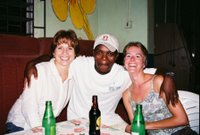
This picture is of me, Dalton (a friend from Discovery Bay), and Holly (my cousin). Dalton was a friend of Holly's when she was in the Peace Corps in Discovery bay and was absolutely wonderful with helping me perfect my driving skills on the left-hand side of the road (quite challenging at times!), taking us to local parties and restaurants, and introducing me to new places we would have never known about otherwise. The last day I was there, Dalton and I hung out in a bar (made up of one counter and enough room for about five seats) up in the hills in his home town (Farm Town...a wonderful quaint area) and burned reggae CD's. A great way to end the trip in Jamaica!
My favorite picture...Kids from a local camp showing me baby hermit crabs:
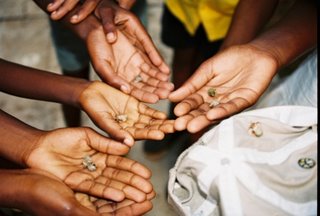
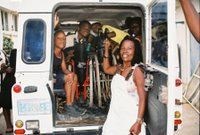
Jackie, in the picture to the left, is an amazing lady. The day we met her she had 25 kids with her. Jackie takes in children--physically and mentally disabled, physically and sexually abused, and others whose parents decided to give them to Jackie. Currently, about five (or more) of these children live with her. In the summer she runs a five week camp. She teaches them basic survival skills since so many of them are on their own. She wants to teach them basic skills so that they succeed with whatever lot in life they have been given. Since Jamaica doesn't always have the conveniences of electricity and running water in all areas, Jackie teaches them things like how to make pudding over an open fire. She doesn't have many volunteers. Most times it is just her. And she doesn't receive much funding. Funders usually want to tell her specifically how to use the funds. She feels she knows the kids better than the funders and knows what they need. The last big grant she received was used to create a something she felt would benefit the kids longer term. I guess the funders didn't like that because it wasn't the way they had designated the funds. She said she hasn't received anything from them since. It doesn't stop Jackie. She is committed to the kids.
Arriving in Discovery Bay (Puerto Seco beach):
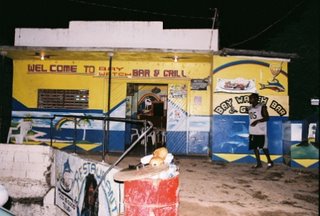



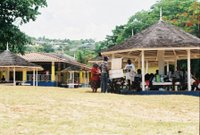
Puerto Seco Beach is the most beautiful beach. It has beautiful white sand and wonderful clear water. You can buy jerk chicken and rice and peas at the cook shack and then buy ice cream from the man on the motorcycle (picture to the left).
Columbus Park:



Discovery Bay is supposedly where Columbus first set foot. The locals don't seem too thrilled that Columbus came to "found" the area they had already established. They see Columbus as a rapist who took over, raping the land and the women and creating slaves out of the people already there. And we claim him as a "hero" in our history books.
(side note: Shouldn't we re-think who we claim as our historical heroes??? Our country claims to have such issues with "immorality" these days...yet we hold up historical "leaders" who raped and destroyed land and people and supported and contributed to slavery. What example do we set for our children when those are the "leaders" we hold up...and what do we say to our children when we brush aside their faults as "just a product of their time??)
Foods in the market:





The market is always a favorite place of mine. I love to see (and eat!) the native fruits and vegetables. The huge avocados are absolutely wonderful diced on a plate with lime squeezed on top and a little salt. So much more flavor than the avocados here! The lady who ran the Patiently Waiting Villa we stayed at made us Acchi and Saltfish--a breakfast dish. The acchi (the pinkish stuff with black seeds in the picture to the left) is something like scrambled eggs...combined with saltfish and sauteed onions...delicious!
Beautiful trees and flowers:


I'm so disappointed that I never did get to drink coconut water straight from the green coconuts (the tree in the picture above). We did crack and eat a fresh coconut, though. Jamaica was so lush and green. Just the greenery around was relaxing!


This was a beautiful place undisturbed by tourists. It's down from Dunn's Falls, the popular tourist waterfall. The interesting thing about this natural falls is that it is where the locals come and take baths...literally!!...as well as play and swim. What was even more intriguing to me was that they don't necessarily bathe there because they don't have running water at home. The lady that took us there has a wonderful home. Yet she went with the full intention of bathing...soap and all. She explained that they just love the clean and smooth feeling of the water. Though most bathe with their suits on, there was at least one man who took the task seriously using the waterfall as his own personal shower!
Outdoor bar:

Though a little difficult to see, the hut-looking structure on the water is an outdoor bar. We attended Dalton's friend's birthday party in the open-air with the water lapping right below us.
Those are a few of the pictures and the stories. If you know me well at all, you know I have many more pictures from this trip in my collection that I would be happy to share if you're interested in living vicariously and seeing someone else's "home movies."

This picture is of me, Dalton (a friend from Discovery Bay), and Holly (my cousin). Dalton was a friend of Holly's when she was in the Peace Corps in Discovery bay and was absolutely wonderful with helping me perfect my driving skills on the left-hand side of the road (quite challenging at times!), taking us to local parties and restaurants, and introducing me to new places we would have never known about otherwise. The last day I was there, Dalton and I hung out in a bar (made up of one counter and enough room for about five seats) up in the hills in his home town (Farm Town...a wonderful quaint area) and burned reggae CD's. A great way to end the trip in Jamaica!
My favorite picture...Kids from a local camp showing me baby hermit crabs:


Jackie, in the picture to the left, is an amazing lady. The day we met her she had 25 kids with her. Jackie takes in children--physically and mentally disabled, physically and sexually abused, and others whose parents decided to give them to Jackie. Currently, about five (or more) of these children live with her. In the summer she runs a five week camp. She teaches them basic survival skills since so many of them are on their own. She wants to teach them basic skills so that they succeed with whatever lot in life they have been given. Since Jamaica doesn't always have the conveniences of electricity and running water in all areas, Jackie teaches them things like how to make pudding over an open fire. She doesn't have many volunteers. Most times it is just her. And she doesn't receive much funding. Funders usually want to tell her specifically how to use the funds. She feels she knows the kids better than the funders and knows what they need. The last big grant she received was used to create a something she felt would benefit the kids longer term. I guess the funders didn't like that because it wasn't the way they had designated the funds. She said she hasn't received anything from them since. It doesn't stop Jackie. She is committed to the kids.
Arriving in Discovery Bay (Puerto Seco beach):





Puerto Seco Beach is the most beautiful beach. It has beautiful white sand and wonderful clear water. You can buy jerk chicken and rice and peas at the cook shack and then buy ice cream from the man on the motorcycle (picture to the left).
Columbus Park:



Discovery Bay is supposedly where Columbus first set foot. The locals don't seem too thrilled that Columbus came to "found" the area they had already established. They see Columbus as a rapist who took over, raping the land and the women and creating slaves out of the people already there. And we claim him as a "hero" in our history books.
(side note: Shouldn't we re-think who we claim as our historical heroes??? Our country claims to have such issues with "immorality" these days...yet we hold up historical "leaders" who raped and destroyed land and people and supported and contributed to slavery. What example do we set for our children when those are the "leaders" we hold up...and what do we say to our children when we brush aside their faults as "just a product of their time??)
Foods in the market:






The market is always a favorite place of mine. I love to see (and eat!) the native fruits and vegetables. The huge avocados are absolutely wonderful diced on a plate with lime squeezed on top and a little salt. So much more flavor than the avocados here! The lady who ran the Patiently Waiting Villa we stayed at made us Acchi and Saltfish--a breakfast dish. The acchi (the pinkish stuff with black seeds in the picture to the left) is something like scrambled eggs...combined with saltfish and sauteed onions...delicious!
Beautiful trees and flowers:



I'm so disappointed that I never did get to drink coconut water straight from the green coconuts (the tree in the picture above). We did crack and eat a fresh coconut, though. Jamaica was so lush and green. Just the greenery around was relaxing!
Natural Waterfall outside of Ocho Rios:


This was a beautiful place undisturbed by tourists. It's down from Dunn's Falls, the popular tourist waterfall. The interesting thing about this natural falls is that it is where the locals come and take baths...literally!!...as well as play and swim. What was even more intriguing to me was that they don't necessarily bathe there because they don't have running water at home. The lady that took us there has a wonderful home. Yet she went with the full intention of bathing...soap and all. She explained that they just love the clean and smooth feeling of the water. Though most bathe with their suits on, there was at least one man who took the task seriously using the waterfall as his own personal shower!
Outdoor bar:

Though a little difficult to see, the hut-looking structure on the water is an outdoor bar. We attended Dalton's friend's birthday party in the open-air with the water lapping right below us.
Those are a few of the pictures and the stories. If you know me well at all, you know I have many more pictures from this trip in my collection that I would be happy to share if you're interested in living vicariously and seeing someone else's "home movies."
Labels:
children,
Jamaica,
photography,
travel
Subscribe to:
Comments (Atom)